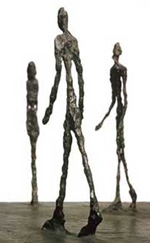Presenting History
Other PeopleShortcomings are much easier to detect in others. One readily makes excuses for oneself, but the faults of others are glaring faults. That is to say, other people are somehow part of the methodology. This too was known to the ancients:
- When I am walking in a party of three, I can always find a teacher among them. I note the good stuff, and do likewise. I note the bad stuff, and quit doing it. (Analects 7:22)
One modern equivalent of a walk "in a party of three" is half an hour spent in reading other people's work. If they get a good result, you can use it as an inspiration to go and do likewise. If they make some glaring error, you can the more easily recognize that error when it recurs in your own work. And if in that same half hour somebody has been looking over your stuff, and has criticisms for you about what they find, be sure to take them in good part.
It has been said that you cannot learn anything with your mouth open. Not necessarily. Maybe you hear yourself lecturing to your class, parroting the textbook, and suddenly you think to yourself, "Garbage; how do we know that this is so?" In that moment, you have become your own party of three. You are on your way to independence as a researcher.
Other Ages
The unconscious bias of one generation is more likely to be spotted by the next generation. The art forgery of one age may succeed in that age, but in a later age, its contemporary qualities, the points at which it belongs to its own time, become apparent. Here is Hoving on art forgery:
There is a standing dictum about forgery: it will never last beyond one generation. The style of the maker is permeated by his generation. No matter how he tries, his own time will eventually show in what he does. There is a lot of forged Coptic on the market today. Coptic is strong, overstyled, overstated. Our day is like this. Primitive art is collected for its strength and its brutality. Our age appreciates this and seeks it out. Therefore, Coptic art is being forged today. We are too close to it to see the forger's style. People a generation hence may howl with laughter and wonder how we could have been fooled.
Errors of other kinds are likely to stand out in the same way. Friends can help; self-examination can help. But posterity may be our most effective proofreader.
Omissions as well as errors get corrected over time. As the Analects comes very near to saying:
Avoid the error you are aware of, and the error you are not aware of, other people will eventually point out. (Analects 13:2, paraphrased)
History is thus a cooperative enterprise, and part of its cooperation is with future historians. Westcott and Hort, in concluding the Introduction to their epochal edition of the Greek New Testament (1882), acknowledged this situation in an especially graceful way:
Others assuredly in due time will prosecute the task with better resources of knowledge and skill, and amend the faults and defects of our processes and results. To be faithful to such light as could be enjoyed in our own day was the utmost that we could desire. (p323)
Neighbors
It is obvious that success in a complex or protracted investigation may not be possible for one individual. The contributions of many, over a longer span than one person can expect to live, are often required. Despite the romantic impression one can get from popular accounts of great discoveries, that is true in science also. The ultimate investigator, in history, is the community of historians. That larger colleagueship is a practical necessity. Its existence over time is also a theoretical necessity. It solves a problem that we otherwise couldn't address. History, as was long ago said of virtue . . .
. . . is not solitary. It needs neighbors. (Analects *4:25).
Readings
- John McPhee. A Roomful of Hovings. Farrar 1968
17 Mar 2006 / Contact The Project / Exit to Outline Index Page

